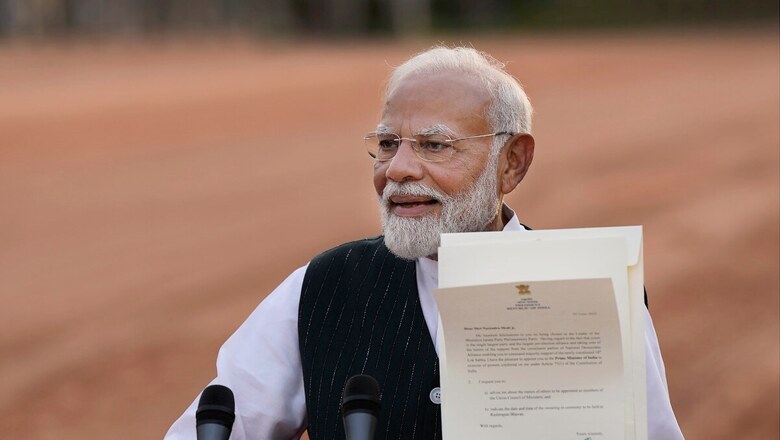
views
Although the BJP-led NDA alliance fell short of its expected seat count in the Lok Sabha, it still secured a third consecutive term in government by winning 293 seats. However, the BJP, the largest party within the alliance, did not achieve a majority on its own as it had in the 2014 and 2019 elections, securing only 240 seats this time.
These results have emboldened the Opposition, particularly the Congress party, which was able to increase its seats to 99. Since the declaration of the results on June 4, the jubilant Opposition and its ecosystem have been claiming that Modi has morally lost the election as voters have rejected the Modi-led BJP. These claims are being made to create a perception in favour of the Opposition.
But these claims of the Opposition can’t belittle the fact that despite 10 years of anti-incumbency, the BJP-led NDA under the prime ministership of Narendra Modi has been able to return to power — a historic feat since the 1962 elections. Opposition shouldn’t forget the basic fact that the NDA is a pre-poll alliance fought with Modi as the face. Having said that, the BJP and its ecosystem have to accept the fact that challenges before Modi 3.0 government are numerous and these have to be addressed.
Addressing unemployment should be the priority
One of the prominent issues is unemployment. It has been a burning issue in India, and the Modi government’s failure to adequately address it over the past ten years is widely seen as a significant factor in the BJP’s loss of 63 seats nationwide and its inability to secure a majority on its own.
According to data provided by the Union government last year in the Parliament, there are nearly 10 lakh vacancies in various government departments. While the government has made efforts to fill these vacancies, including the distribution of over 1 lakh appointment letters to new recruits by PM Modi under Rozgar Mela, lakhs of vacancies still remain.
Modi 3.0 should prioritise filling these public sector vacancies as jobs in this sector are particularly important to the common people. However, simply filling existing vacancies is unlikely to completely address the pressing unemployment issue. Therefore, the government must create more jobs, recognising the limitations of public sector employment generation. As a result, the government should focus on stimulating job creation in the private sector.
An efficient system to prevent paper leakage
Modi 3.0 has faced a turbulent start, with students expressing anger over alleged paper leaks in the National Eligibility-cum Entrance Test (NEET). The matter is currently before the Supreme Court. Adding to the challenges, the government has cancelled the UGC-NET exams based on available information, citing a need to protect students’ interests. This cancellation raises serious questions about the inefficiency of the administration to conduct exams in a fair manner.
Allegation of paper leaks is a serious issue and cannot be taken lightly. These exams, whether NEET or UGC-NET, are crucial to students’ futures. This year, paper leaks in Uttar Pradesh’s police recruitment exams, followed by cancellations, exposed the state administration’s inefficiency. This affected 48 lakh students who had taken the exams, and the resulting dissatisfaction was reflected in the state’s Lok Sabha results, where the BJP lost 29 seats.
The current issue regarding NEET exams and the cancellation of the UGC-NET exams have undoubtedly dealt a blow to the Modi 3.0 government, which has already seen a dip in popularity among voters. The government must take decisive action to ensure these exams are conducted fairly. Continued irregularities will only further erode the current administration’s standing.
PM Modi’s silence on critical issues
The recent Lok Sabha results have emboldened the Opposition, which has seized upon the alleged paper leak issue. While Prime Minister Narendra Modi has yet to publicly address the matter, his silence has been interpreted by some as a sign of indifference, potentially damaging his image and alienating voters. This silence, combined with his limited public statements on the Manipur situation, has contributed to the BJP-led NDA’s loss in the two seats of the Northeastern state. By remaining silent on these critical issues, Prime Minister Modi risks allowing the Opposition to exploit the situation, potentially eroding public trust in his leadership.
Building an efficient communication system
To strengthen its connection with the public, the government must establish a more effective communication system that involves ministers and MPs directly at the grassroots level. Over-reliance on bureaucrats for communication can be detrimental, as they often lack the nuanced understanding of local realities, including caste, religion, tradition, and culture, that elected representatives possess. By engaging more directly with communities, the government can better understand their needs and concerns.
A review of the various welfare schemes
One of the key factors contributing to the BJP-led NDA’s victory is the government’s implementation of various welfare schemes over the past decade. Initiatives such as opening bank accounts, providing direct monetary aid for toilet construction, offering free gas cylinders, transferring funds to farmers three times annually, providing free medical check-ups up to Rs 5 lakh, and distributing 5 kg of free ration per person have undeniably benefitted recipients in ways unprecedented by previous governments.
However, Modi 3.0 should not rest on the laurels of these existing schemes. Regular review and adjustments are crucial, as welfare programs address short-term goals and must adapt to changing circumstances. Despite initial successes, there are allegations that some schemes are no longer effectively meeting current needs.
Take, for instance, the Ujjwala Yojana. Many beneficiaries are unable to refill their free gas cylinders due to rising prices, rendering the scheme less effective. This issue, coupled with the government’s failure to address the price increase, received little mention among voters during the recent elections.
Similarly, the government should reassess its decision to provide 5 kg of free ration to over 80 crore people. Within this large group, there are marginalised families whose needs exceed the current ration allotment. The government should identify these families and increase their rations accordingly. Additionally, a thorough review is needed to determine if all 80 crore families are actually receiving the benefit and if this level of free ration is truly necessary for all recipients.
One of the prominent government schemes is the Jan Aushadhi scheme, which provides medicines at low prices. Unfortunately, this scheme isn’t widely discussed. Despite receiving little attention in the mainstream media, high medicine prices are a crucial issue for a large part of the population — and the Jan Aushadhi scheme was launched to address this.
However, this scheme, despite helping some, isn’t working as well as expected. Jan Aushadhi stores carry medicines with generic names, but doctors often don’t prescribe medicines by their generic names. This creates problems for beneficiaries looking for medicines in Jan Aushadhi stores. Additionally, many essential medicines are often not found in these stores. The loopholes in this important scheme need to be reviewed, considering the large section of the population already worried about rising medicine prices.
Sagarneel Sinha is a political commentator and tweets @SagarneelSinha. Views expressed in the above piece are personal and solely that of the author. They do not necessarily reflect News18’s views.




















Comments
0 comment